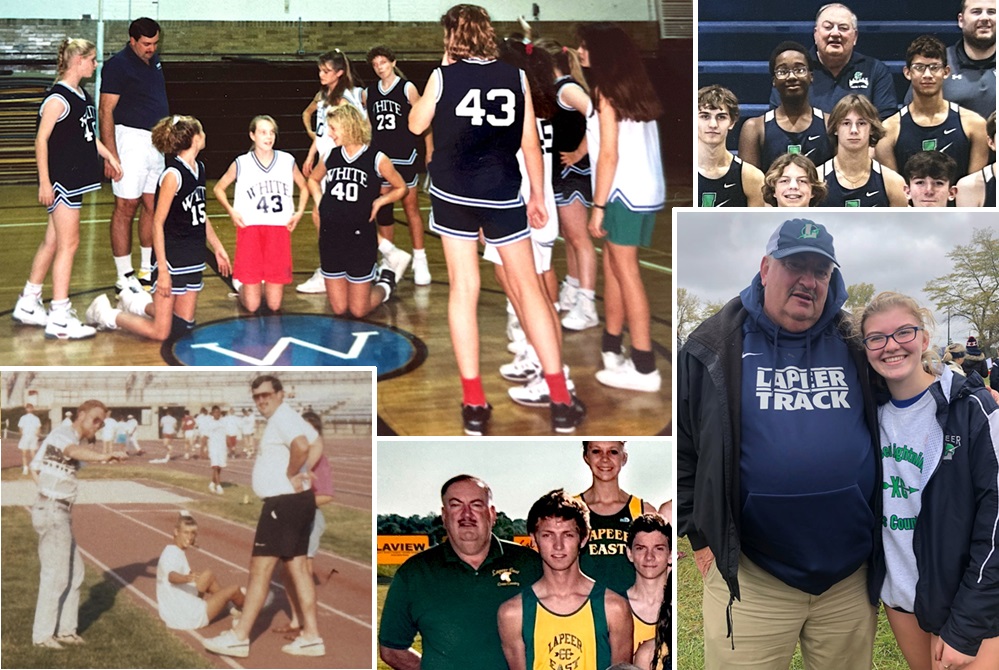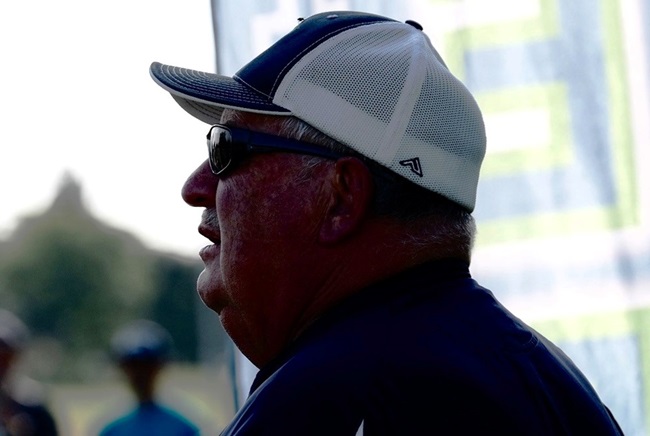
MHSA(Q&)A: Stevensville-Lakeshore wrestling coach Bruce Bittenbender
February 9, 2012
Bruce Bittenbender grew up in Bethlehem, Pa., in the heart of steel country, and worked part-time in a mill as a young adult. That helped land him in Michigan City, Ind., not long after graduating from Milligan College in Tennessee in 1969.
But Bittenbender wanted to teach and coach.
Bittenbender took a teaching job at South Haven that fall, and as an assistant coach helped that school's wrestling team to the MHSAA Class B championship. A year later the wrestling coaching job opened at Stevensville Lakeshore. He says now that he was too young for the job, but Bittenbender applied and was hired. The program was struggling at that point -- but not for much longer.
According to the National Federation of State High School Associations' record book, Bittenbender trailed only Rex Peckinpaugh of New Castle, Ind., in career dual coaching wins heading into this season (796-780). Bittenbender won his 800th match on Jan. 14 -- and has his team just two more victories from MHSAA Finals weekend Feb. 24-25 in Battle Creek.
Bittenbender retired from teaching two years ago after 35 teaching biology and seven more physical education. At 64, he still gets on the mat with his wrestlers from time to time, although perhaps not as much as he once did. But countless wrestlers -- including those who won a combined 20 individual championships -- have benefited from his instruction.
His coaching tree includes current Rockford coach Brian Richardson and former Lowell coach Dave Strejc, who led teams to MHSAA Division 2 championships in 2002 and 2004. Bittenbender was named National Coach of the Year by the National Federation of State High School Associations in 2002 and again by the National High School Athletic Coaches Association in 2010. He is a member of the Michigan Wrestling Association Hall of Fame, and he will be inducted into the Pennsylvania Wrestling Coaches Association Hall of Fame this spring.
Stevensville Lakeshore is ranked No. 7 in Division 2. His team won its District on Tuesday, downing St. Joseph 35-34 with a decision win in the final match.
What keeps you coming back for another season?
Every year, when you think you've seen it all, something else comes up. When I was in middle school, it was junior high school back then, I was on the edge. The coach (Jim McIntyre, who went on to coach at Kutztown University) grabbed me on the back of the neck and said, "What are you doing?" I was hanging out with kids of questionable character, and he said, "You need to come out for wrestling." I still go back and play golf with that guy once in a while. ... I came from a big family. We didn't have much. I have empathy for the kids that were kicked around, misdirected. Somebody took time out for me. I felt maybe I could kick some of that back.
After so many wins, do you still enjoy all of them the same?
I tell ya, last night I certainly enjoyed the win. It was just like I was 23 again. Yeah, I enjoy it. It's addictive. That's what you're out there for.
The NFHS changed its wrestling weight classes this season, but Michigan chose to stay with its current lineup. What is your thought on that switch?
I think it's going to switch back. It makes no sense to me. The average kid graduating from high school is 5-(foot-)9, 155 pounds. Why add a weight class at the top where you have to compete for kids with football and basketball. … Our sport has prided itself on giving the little guy a chance. ... He can be a state champ in wrestling.
Your teams have finished MHSAA Finals runner-up twice. How much would you like to win that first championship?
I would love to. That's the ultimate goal. We've been so close. We were up three points in '94, and got pinned at heavyweight (to lose 28-25 to Fowlerville). In '86 we broke the record for individual number of points scored, but Eaton Rapids broke it too. We were that close.
I'm assuming you're not going to stop coaching any time soon.
Being around people and the community, and working with kids, it keeps you young. Keeps you in shape, keeps you motivated. I think that's one of the reasons. Now that I'm not teaching, my wife and I are able to travel quite a bit in the fall and summer. I think that's basically a motivator, just being around people.
What do you tell, or would you tell, young coaches who are just getting started in high school wrestling?
I tell them to be careful the first few years. It's different today. … I tell coaches you need to set up standards, discipline, goals and objectives, and go by those. You try to accommodate some of these kids, and this and that, but you can go only so far. You’ve gotta stick to the rules and let the cards fall where they are. If you don't, you'll have problems down the line.
And I think communicating with people, making friends, getting out there and strumming up support for the program is important too. I've had the opportunity to speak to the Lions Club, various civic organizations, at hospitals. You have to try to make yourself available. People have to learn to put their trust in you."

'Lapeer Through and Through,' Schmidt Surpasses Half-Century in Coaching
By
Paul Costanzo
Special for MHSAA.com
April 2, 2025
Manny Schmidt still wants to be at track practice.
 After 50-plus years coaching in Lapeer, the man they call Coach Manny has not lost his love for helping student-athletes – and at this rate, he might go another 50.
After 50-plus years coaching in Lapeer, the man they call Coach Manny has not lost his love for helping student-athletes – and at this rate, he might go another 50.
“I told my wife years ago that the first day I don’t feel like going to practice, that I’d rather be somewhere else, that’s the day I’m done,” Schmidt said. “And it hasn’t happened yet. Obviously, you have bad days and things like that. But track, and right now practice, it just keeps me going.”
Schmidt, who is the head boys track & field coach at Lapeer, began coaching track as an assistant in 1974, and has remained there – and Lapeer East, then back at Lapeer when the schools merged back together – ever since. On Friday, April 11, he will be honored at an event at Lightning Rounds in Lapeer for his years of service to Lapeer athletes. The event begins at 7:30 p.m., following the Lapeer Lightning Co-Ed Relays.
“Manny has been a staple of Lapeer Athletics through many different renditions over the years,” Lapeer athletic director Shad Spilski said. “His willingness to help student-athletes grow and achieve their goals is all he wants out of his athletes. Manny spends, and has spent, countless hours over several decades providing athletes multiple opportunities to hone their skills. He not only coaches, but he is one of Lapeer athletes’ biggest fans and supporters. You will always find him at other sporting events cheering on athletes and his coaching colleagues. He truly is Lapeer through and through.”
Schmidt came to Lapeer to teach English in December of 1972 after graduating from Western Michigan University. He had attended high school at St. Joseph Catholic, and was unfamiliar with Lapeer.
But it didn’t take long for him to fall in love with the school community after receiving the assignment.
“Almost immediately,” he said. “I started in December; the teacher had left and I got the job in December. Three days later, they had a staff Christmas party that I got invited to, and all of my close friends over the years, many of them, I guess, I met at that party.”
Coaching was always something Schmidt wanted to do. He played basketball and ran track in high school, and had a basketball coach who made a big impact on his life. He wanted to do the same for others.
In the spring of 1974, during his first full year of teaching English at Lapeer, he got that chance as the assistant track coach. He has since coached cross country – working to start the Lapeer East girls program in the 1990s – junior varsity football and middle school basketball. He also served as a basketball official for more than 30 years.
“I just liked being part of it,” he said.
 Throughout his five decades coaching track, Schmidt has worked with athletes in every event. While middle and long distance are what he’s long enjoyed coaching, he’s currently working with the Lapeer throwers and high jumpers, as head cross country coaches Russ Reitz and Bill Spruytte are also coaching track.
Throughout his five decades coaching track, Schmidt has worked with athletes in every event. While middle and long distance are what he’s long enjoyed coaching, he’s currently working with the Lapeer throwers and high jumpers, as head cross country coaches Russ Reitz and Bill Spruytte are also coaching track.
“In our program, we have four of us (Schmidt, Reitz, Spruytte and Anthony Merlo), and we all have equal voice, we all coach together,” Schmidt said. “On any given day, and that’s the nice thing, I could be with anything. I could be with the hurdlers.”
This past year, Schmidt returned to the Lapeer cross country staff as an assistant, saying he was honored that the current coaches respected him enough to call him back.
But for them, it was an honor to have him.
“Working with Manny is like having access to decades of knowledge,” said fellow cross country assistant Christine Cerny. “It is such a privilege to be able to draw from that and learn from that myself. It’s so awesome to be able to coach alongside him after he has coached my kids.”
During his time, Schmidt has coached multiple generations of Lapeer families, including his own. His children Corrinne and Jennifer both ran for him, as did his grandchildren Morgan, Mason and Colton.
And by his side the entire time has been his wife, Val, who worked as a scorekeeper during meets.
“When I started coaching, she would be the person at all our home cross country meets and all our home track meets who sat there and kept track by hand,” Schmidt said. “Probably the happiest person with this new technology is my wife – now she doesn’t have to do it. When we have invites, she’ll do medals and stuff like that.”
Technological changes have been abundant for high school athletes over the past five decades, not just in competition but outside of it. Schmidt recalls returning to Lapeer from away meets and having athletes line up at the school’s two payphones to call their parents.
“Now, when we get back, everyone has called home and their rides are there waiting,” Schmidt said.
Throughout his time, Schmidt has done plenty of winning and coached several athletes who have moved on to compete at the college level. But the relationships he’s created are what he values most.
“Nobody’s luckier than I am with where I taught and where I coached, and who I’ve coached with over the years,” Schmidt said. “You have to look forward to going to work, and I hate to use the word ‘work’ with coaching. It is, I guess. But there’s just so much good with it.”
 Paul Costanzo served as a sportswriter at The Port Huron Times Herald from 2006-15, including three years as lead sportswriter, and prior to that as sports editor at the Hillsdale Daily News from 2005-06. He can be reached at paulcostanzo3@gmail.com with story ideas for Genesee, Lapeer, St. Clair, Sanilac, Huron, Tuscola, Saginaw, Bay, Arenac, Midland and Gladwin counties.
Paul Costanzo served as a sportswriter at The Port Huron Times Herald from 2006-15, including three years as lead sportswriter, and prior to that as sports editor at the Hillsdale Daily News from 2005-06. He can be reached at paulcostanzo3@gmail.com with story ideas for Genesee, Lapeer, St. Clair, Sanilac, Huron, Tuscola, Saginaw, Bay, Arenac, Midland and Gladwin counties.
PHOTOS (Top) Clockwise from the top left: (1) Manny Schmidt (standing, second from left) coaches the Lapeer White Junior High girls basketball team. (2) Schmidt, top middle, takes a photo with Lapeer’s boys track & field team last spring. (3) Schmidt, left, has coached three of his grandchildren including Morgan Turk. (4) Schmidt, far left, takes a photo with the 2011 Lapeer East cross country teams. (5) Schmidt, standing far right, coaches Michelle Brundage during the 1991 Meet of Champions. (Middle) Schmidt looks on during an event. (Photos provided by the Lapeer athletic department.)

